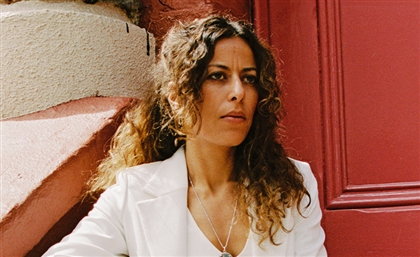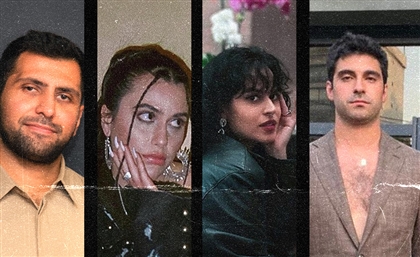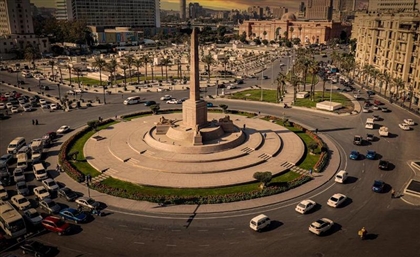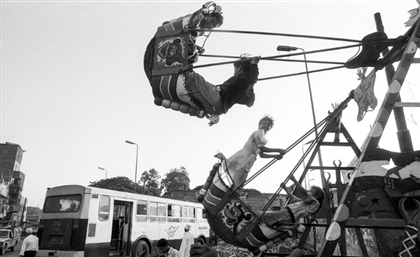Meshwar Band: Reggae With an Egyptian Twist
We invite Meshwar Band over to sit down with Seif Bibars, where they talk about music, gigs, war, peace, and how it's not compulsory for all Reggae artists to smoke weed.
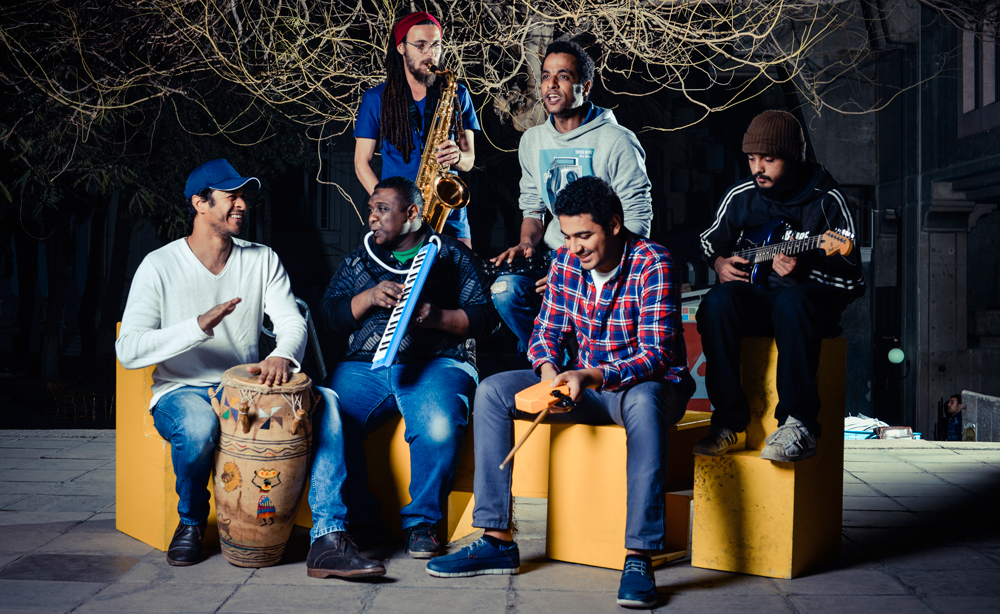
The word ‘meshwar’ is Arabic for journey – split it in half and you’re left with ‘mesh’ ‘war’. ‘Mesh’ is Arabic for ‘not’, and ‘not war’ (mesh war) is the message that Meshwar – the band – is trying to deliver through music. After witnessing the thriving phenomenon that is Egyptian Reggae evolve rapidly during the past five years – primarily through Meshwar, as they are currently the only Egyptian Reggae band that performs regularly and has any original songs to their name – I take it upon myself to find out how Meshwar came to be and what they are seeking to accomplish through their music. I talk to the band to find out what they think of the current Reggae scene in Egypt, and if smoking marijuana is compulsory for Reggae musicians. Together with Meshwar, I set out on a meshwar of my own, to shatter stereotypes and misconceptions associated with Reggae music and to take you, the reader, behind the scenes of the world's only Egyptian Reggae movement. I invite the whole band - musicians and other members that work backstage - to help me uncover their story and their mission to show the world that the answer is peace mesh war. Word.
I’d like to start off this interview by asking you, how did the Meshwar begin?
Mohamed Labib: My name is Mohamed Labib and I’m the band’s Saxophonist. Meshwar officially started in 2011; however, before that, in 2009, Diaa and Ahmed, the oldest members in the band, were already playing music together. In 2011, I met up with them and we decided to start the Reggae Meshwar that we now know. In the past five years since the beginning of the Meshwar, we gained and lost several members.

Do you only play Reggae music or do you play other stuff, too? And how do you all know each other?
Ahmed Youssef: The music was the thing that brought us together. We didn’t know each other until we met in the studio. We tried making some Reggae tracks; it wasn’t pure Reggae at first, later it progressed when we found out that people liked this kind of music and it was new on the scene in Egypt. So we started making tracks and it went well with the mood of the revolution at the time. Everyone started doing their homework when we realised how much people liked it, so everyone studied their craft – guitarist, drummers, etc.
Do you like Bob Marley and, if so, how long have you been smoking weed?
Mohamed Labib: It has nothing to do with the music; let's avoid that ideology. The people that influenced the band the most were Bob Marley, Peter Tosh… all the 70s and 80s Reggae. Most people think that we smoke weed all the time because of how we look and the dreads; they think we're Rastafarians. All of those are just stereotypes that have nothing to do with the music. Music is much more than that! A lot of Reggae artists actually don’t smoke or have dreads, a lot of them are light-skinned and not from Jamaica, and they managed to influence the scene. Some of them are Muslims, Christians, Rastafarians; people just always classify us as that when we play our music, but, at the end of the day, it’s not a factor in the music, as though because we play Reggae then we have to be like that. We're different, even amongst each other in the band; we try to show that to the people through the music because, at the end of the day, “matbosesh ba2a shakl eh mahamenash." Halawany said that five years ago. "Wely fara2 ma7abenash." These are our lyrics. Don’t classify people in a certain category; at the end of the day, the only category we're in is that we love Reggae music. It's all about passion for music.

I heard about something you were doing Mesh-war (opposed to war) or something like that? Peace music, I want to know a little bit more about that project.
Mohamed Labib: Its not a project or a side project, our band name is Meshwar. Part of that is that its not a war (Mesh-War) and the main concept of reggae music – all over the world – is all about peace, love, freedom, youth…etc. This is also what we sing about, we have songs mainly about peace… Halawany & Tito have a lot of these songs, its not a side project, its actually what the subject is. We're addressing peace in different ways, directly and indirectly; Inner peace and so on. Also Meshwar is used as in a path.
Did you play abroad or did you get offers to play abroad?
Mohamed Hassan: Should I say the truth or not? (Laughs) Some people don’t know this, except for Labib, a couple of months ago someone and I shared something by Meshwar and he read someone writing in Hebrew asking when are they coming to Israel? So My friend tagged me in it and so then the man added me and messaged me asking me to play in Tel Aviv. I told him if we went over to jam there we wont get anything else done, in our lives, ever (laughhs). Some offers are coming through though, we might be going to Jordan in September to join the Amman Festival.

I’m sure everyone has their own personal favourite gig, a certain experience or top notch performance, but, then again, each band always has one gig where they can all agree that that was the best one.
Mohamed Hassan: I'll have an issue answering that because, on the day of a Meshwar gig, I wake up and drink my coffee and just wait for the sound check. In the midst of all the insanity of the projects you work with, you end up just waiting for one project you prefer. Even if we had a gig every day, I'd ask them to have two gigs a day, then three. It’s like a drug; you're just happy when you see them.
Mohamed Youssef: I generally prefer Darb back in 2013; that was one of my favourites.
Nazmy: I also loved Darb a lot because of a story I had. I was a fan of Meshwar and I bought a ticket and went to attend the concert, and it was a dream of mine to join that band in any way. It came true. It was one of the best performances I've seen for Meshwar and that was one of the concerts where I wished I could join Meshwar in any project. Here we are in 2016, and I’m with them.
Who influences you and what are your inspirations in doing what you do?
Mohamed Labib: At first it was the artists we heard of - Bob Marley, Peter Tosh. Then we started looking at it in eras - the 70s and the 80s - and so every era there's always someone who dominated it. After Bob Marley, there was Burning Spears, Lucky Dube, Alpha Blondy is more of the 90s, Groundation, and Dub Ink. In the last 10 years there are a lot of bands that came from Latin America. There's also a pretty strong scene in Europe.

Do you think there's room for the Raggae scene to grow in Egypt, or is it not catching on?
Mohamed Labib: The scene is getting better, by the way; we've been playing for four years. Four years ago, we would have 40 people show up, then it turned into 80, then 800, then 1000 - so, it's getting better. Also, some bands come to us with the Reggae tracks they want to play, asking us for our opinions. Or someone mixing a Reggae track would call Mohamed Hassan and ask how the snare usually is, you know? The scene is increasing, and the music is pretty catchy. It's catchy, simple music, and the words are in Arabic, so it will affect a lot of people.
So, you don’t want to leave Egypt?
Mohmaed Labib: Wait a minute, we never said that (everyone laughs). Most probably Spain. Its not the best scene but it’s the biggest.

I also wanted to ask about the one festival you'd love to play at.
Mohamed Labib: A festival called Rototom, in Spain
Mohamed Hassan: Me, personally, I'd like to play in South France in a festival called Garance Reggae Festival - four days of pure Reggae music. We'd play there and then not come back to Egypt (everyone laughs).
For tour dates and more information, follow Meshwar on Facebook here.
Main image photography by @MO4Network's #MO4Productions.
Photography by Ahmed Najeeb.
- Previous Article SolarizEgypt Wins the 'Get in the Ring' Regional Semi-Finals
- Next Article Soraya Bahgat: The Egyptian Stronghold of Women’s Rights




